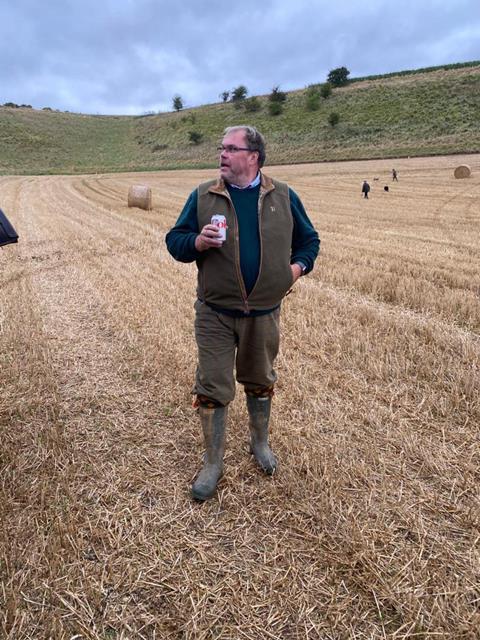Proctor & Associates is seeking recompense after it claims it was delisted without notice, and its own suppliers used by the discounter instead
In its pomp, Proctor & Associates was a thriving UK business, responsible for supplying its chief customer, Lidl, with almost 60 lines of fresh fruit & veg. Today, by its owners’ own admission, it is nothing but “a shell”.
This week, in an interview with The Grocer, the company’s boss Deane Proctor explains why he is taking the retailer to court in a £2.6m claim over alleged breaches of GSCOP, including claims it went on to forge direct deals with his own suppliers after delisting his company without notice.
It’s a case experts believe could have wider implications for retailer-supplier dealings, and GSCOP itself.
Based in Boston, Lincolnshire, Proctor & Associates was launched in 2003, at a time when Aldi, Lidl and Netto were the three discounters on the block, challenging the traditional supermarkets.
Acting as the middle man for a group of different growers, Proctor says the company, which at its peak employed category managers across 57 different fresh fruit & veg lines in total, quickly found itself at the centre of Lidl’s rapid growth.
“They started to give us programmes and projects, such as sourcing British strawberries or ensuring they got cauliflower every week.
It involved “strategic challenges that carried on for 12 years or so”, Proctor says.
Whatever Lidl wanted, “we were able to come up with, across the board, not just brassicas, which was my background”, adds Proctor.
“Whether it was flowers, exotic fruits, anything you think of, we could source very quickly.”
It meant Proctor & Associates was “focused on driving Lidl’s business rather than anyone else’s”.
“At first, we didn’t have any time to focus on any other businesses,” he says. And the company was “growing very quickly in terms of our turnover”, he says.
“I’d got a group of commercial managers dealing with Lidl’s buyers. We were performing very well. Low cost margins across lots of categories.”
But the reliance on Lidl, claims Proctor, was to turn into a nightmare.
GSCOP’s delisting rules
A retailer must at all times deal with its suppliers fairly and lawfully… without duress and in recognition of the suppliers’ need for certainty as regards the risks and costs of trading, particularly in relation to production, delivery and payment issues.
Prior to delisting a supplier, a retailer must provide reasonable notice to the supplier of the retailer’s decision to delist, including written reasons for the retailer’s decision.
Source: GSCOP legislation, 2009
He says that from 2016 he sensed “games were afoot”. Lidl began significantly reducing its orders, without notice, across its array of products, including asparagus, pumpkins, chillies, squash and other veg used in soups and stews.
Court papers from law firm Gordons LLP, which is representing the company, claim Lidl repeatedly breached GSCOP rules by failing to give reasonable notice.
The documents also allege Lidl went on to use its knowledge of Proctor & Associates’ supply chain to forge direct deals with many of its suppliers, “thereby cutting the claimant out of its own supply chain, established over many years”.
Proctor adds: “We were always a loyal servant and we would drop anything for them.
“You have to be focused like that, it’s all or nothing in the retail trade. I was always trying to check what the retailer wanted in the future. We would offer to grow products to their specs.
“It involved small to medium-sized suppliers who were supplying shelf-ready product on farms, whereas all the major supermarkets had big centralised pack houses which was very inefficient.”
‘Progressive’ delists
When the delists came, they were, says Proctor, “progressive”.
“We were taking grapes from a company in Spalding and I rang the guy and he said we’ve just done an audit and there isn’t any grape packaging.
“Then we found out they had been packing for someone else: Lidl. I just thought they must know that primary producer was in our supply chain.”
“In the background I was trying to think about what I’d done wrong but you can’t help this feeling that they were saying one thing and doing another.
“I felt like I’d been stabbed in the back.”
Proctor claims he raised the issue on repeated occasions with the Groceries Code Adjudicator and was told he could seek arbitration but was warned it could have an impact on future business with the discounter.
“The biggest issue is the power they wield over delists,” he says. “You can lose your business overnight.
“Being strung along and having them talk to primary producers is just absolutely wrong.”
David Sables, CEO of Sentinel Management Consultants, agrees that “retailers cutting suppliers out of the loop and going direct to their suppliers should be a massive no-no”.
In December 2021, Proctor says he received one of only two notices in seven years from Lidl, ceasing all orders.
“They delisted us on everything. I made people redundant [the following] August after we’d paid all the creditors.

“It was almost like they recognised that they needed to send a delist notice, having not sent any for the last eight years.
So where does Proctor stand now? And what does he hope to achieve from the case?
“I’ve been left with a shell of a business. I’d spent £300,000 on software specialising in dealing with their categories.
“We’d got people trained up through university to make them the best they can be.
“I can’t ring somebody else half way through the cycle and say, can we serve you?”
“I think many retailers are riding roughshod over suppliers. We were very good at what we did.
As to his objectives in the case he wants lessons to be learned: “I’d like the supermarkets to deal fairly and follow more what the code says. And the GCA needs to grow to hold them to account more.
“It’s too late for me, my business has been smashed to smithereens by that retailer. All I’m hoping to do is to retrieve some of my costs.
“I’m looking for some kind of recompense but I don’t think they should treat the industry like this otherwise there is not going to be any small to medium-sized agriculture in the UK.”
Groceries Code Adjudicator Mark White said he was aware of the complaint over Lidl but declined to comment because of the ongoing case. Lidl also declined to comment on the case. But experts believe the outcome could open the door for more claims.
White is believed to be dealing with a raft of arbitration processes related to delistings, arising from the ongoing inflation-fuelled wave of supplier cost price increase requests, which retailers have been resisting in the cost of living crisis.
Under GSCOP, suppliers have four months after an alleged breach to submit a request for intervention, but no such time limits apply to the courts.
Sables believes the case could also raise questions over whether the GCA needs more teeth. It could take more than 18 months for it to get to court, but suppliers and retailers alike will be watching closely to see how the story ends.




















No comments yet